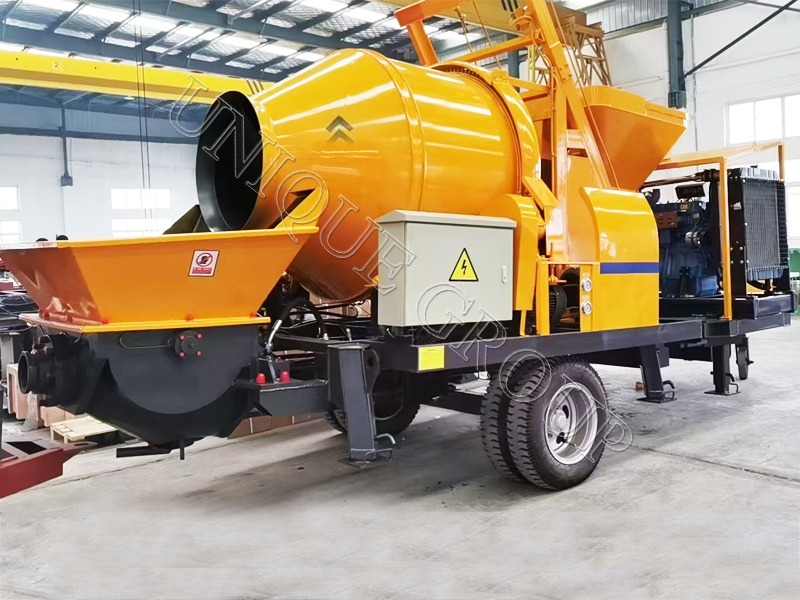What should I consider when buying a concrete mixer pump?
2025-10-28 17:36:33Purchasing a concrete mixer pump is a significant investment that can revolutionize your construction operations, boosting productivity and profitability. However, navigating the market to find the right machine requires careful consideration. A wrong choice can lead to chronic underperformance, frequent breakdowns, and ultimately, financial loss. To ensure your investment is sound, it is crucial to evaluate your needs against several key technical, operational, and support-related factors. This guide outlines the critical considerations to help you make an informed decision.
Project-Specific Requirements: The Foundation of Your Choice
The first and most important step is to look inward at your own business and projects. The "best" pump is the one that best suits your specific needs.
Project Scale and Concrete Volume: Are you working on small residential homes, large industrial complexes, or agricultural projects? The scale and average concrete volume per pour will directly determine the output capacity you require. A pump that is too small will cause delays, while an oversized one will be inefficient and costly to operate.
Site Accessibility and Conditions: Consider the typical terrain and space constraints of your job sites. For congested urban areas or remote locations with narrow access roads, a compact, trailer-mounted mixer pump is often essential. For large, open sites with high-rise structures, a truck-mounted model with a longer reach may be necessary.
Pumping Distance and Height: Calculate the maximum vertical and horizontal distances you will need to pump concrete. This will determine the required output pressure (measured in MPa or Bar). Always choose a pump whose maximum capabilities exceed your most demanding project requirements to ensure a safety margin and prevent overworking the machine.
Technical Specifications and Performance
Once you understand your project needs, you can delve into the machine's technical details.
Output Capacity (m³/h): This indicates the volume of concrete the pump can deliver per hour. Match this to your project's pour rate requirements. For example, small to medium projects may only need 30-50 m³/h, while large-scale infrastructure projects might require 80 m³/h or more.
Engine Power: A powerful, reliable engine is the heart of the machine. It ensures consistent performance, especially when pumping over long distances or working with harsh-mix designs. Look for reputable engine brands known for durability and fuel efficiency.
Mixing System: The mixer should be capable of producing a homogenous, well-proportioned mix quickly. A forced mixing system is often more efficient than a drum mixer for pumpable concrete, ensuring better quality and reducing the risk of blockages.
Pumping System: Investigate the type of hydraulic system and the construction of the concrete cylinder and pistons. These are high-wear components. Robust, well-engineered systems with readily available spare parts will minimize downtime and maintenance costs.
Brand Reputation and Manufacturer Support
The brand you choose is a direct reflection of the machine's likely reliability and the support you will receive. This is where the long-term value of your investment is determined.
Manufacturer's Track Record: Research how long the company has been in business and its reputation in the global market. A manufacturer with a long history is often more reliable. Look for customer testimonials and case studies.
Quality of Construction and Components: A durable machine is built with high-quality steel and incorporates components from trusted suppliers. Don’t just look at the price; assess the overall build quality. Companies that prioritize quality control in their production process, like Zhengzhou Unique Industrial Equipment Co., Ltd. (UNIQUEMAC), build machines designed to withstand the rigors of daily use on a construction site.
After-Sales Service and Parts Availability: This is arguably the most critical non-technical factor. A breakdown is inevitable, but prolonged downtime is not. Ensure the supplier has a comprehensive after-sales service network, offers prompt technical support (including on-site assistance if needed), and maintains a readily available inventory of spare parts. The global support framework provided by UNIQUEMAC is a key reason many contractors choose their equipment, as it guarantees operational continuity.
Operational and Financial Factors
Ease of Operation and Maintenance: A user-friendly control system reduces the learning curve for your operators and minimizes human error. Similarly, easy access to key components for routine maintenance (like greasing points and the hydraulic system) will save time and money over the machine's lifespan.
Total Cost of Ownership (TCO): Look beyond the initial purchase price. Consider fuel consumption, expected maintenance costs, part replacement cycles, and the machine's potential resale value. A slightly more expensive but robust and efficient pump from a brand like UNIQUEMAC will often have a lower TCO than a cheaper, less reliable alternative.
Training and Documentation: Verify that the supplier offers proper operational and safety training for your crew. Comprehensive, well-translated manuals are essential for daily reference and troubleshooting.
Conclusion: A Strategic Investment for Long-Term Success
Buying a concrete mixer pump is a strategic decision that impacts your operational core. It requires a balanced evaluation of your immediate project needs, the machine's technical capabilities, and the long-term partnership with the manufacturer. By meticulously considering your project scope, analyzing performance specifications, and prioritizing a reputable brand with unwavering after-sales support, you can make a choice that delivers lasting value.
Partnering with an established manufacturer like UNIQUEMAC ensures you are not just acquiring a piece of machinery, but a productivity solution backed by engineering expertise and a commitment to your success. Take the time to assess these factors thoroughly—your future productivity and profitability depend on it.
PRODUCT TYPE LIST
NEWS
Contact Us
Address:Industrial Equipment Zone,Zhengshang Road Zhengzhou Henan
Zip: 450000 China
Fax:+86-371-63935058
E-mail:sales@unique-cons.com
TEL:+86-371-63699132





_37.jpg)


